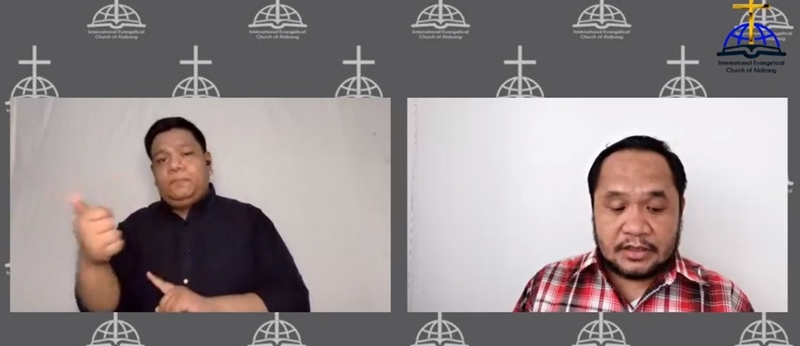Muntinlupa LGU to sign accord to expand services for deaf population
The Muntinlupa City government will be signing an agreement to expand services including sign language for the deaf population.
Mayor Ruffy Biazon has been authorized by the Muntinlupa City Council through Resolution No. 2023-351 to enter into a memorandum of agreement (MOA) with the Deaf Ministry of the International Evangelical Church of Alabang (IECA), headed by Pastor Robert Cosare, to expand its assistance to the city's deaf community in terms of training and developmental communication.

The International Evangelical Church of Alabang using sign language in its service (Screenshot from IECA video)
"We welcome this partnership as it gives us the unique opportunity to reach out to Muntinlupeños who are differently-abled or have difficulty in hearing. As citizens, they also have rights and they must also be given the privilege to participate in our sustainable growth and development," said Biazon.
The 22 year-old IECA, which has had a ministry for the deaf since 2010, not only provides sign language translation for their weekly events but also reaches out to the deaf community by helping them connect with their families through better and clearer communication.
Under the agreement, IECA will be working together with the city’s Persons with Disabilities Affairs Office (PDAO) to push for the rights of the deaf through sign language training for members of the family and the community.
They will also help provide qualified interpreters for instances where there is a need for timely and accurate delivery of information, as well as resource persons to address the needs of the deaf community.
The PDAO is the city government's primary office dealing with the PWDs of the population, and will be responsible for identifying deaf constituents for targeted programs and activities.
The MOA is also explicit in stating that IECA will not be receiving financial benefits in accordance with the principle of the separation of church and state.
Republic Act No. 11106, or the Filipino Sign Language Act, calls for the widespread use of Filipino Sign Language in education, work places, health system, and other public transactions and services by offering opportunities for increasing sign language competency among the hearing members of the citizenry.
The latest numbers showed that at least one million or around 1.53 percent of Filipinos are hampered by disabilities, with a sizable--and growing--number clinically classified as being deaf.